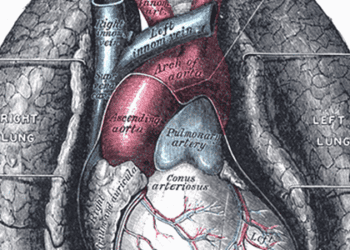The NINDS trial: Tissue plasminogen activator in acute ischemic stroke significantly improves functional outcomes [Classics Series]
1. Treatment of acute ischemic stroke with tissue plasminogen activator within 3 hours of symptom onset significantly improves functional outcomes three months after the incident, when compared with placebo
2. Tissue plasminogen activator is significantly associated with higher rates of symptomatic intracerebral hemorrhage
Original Date of Publication: December 1995
Study Rundown: Prior to the NINDS trial, there had been some evidence that thrombolytic therapy benefitted patients with ischemic stroke, though intracerebral hemorrhage was a frequent complication. Several previous studies had found that early treatment (i.e., thrombolytics within 3 hours of symptom onset) was associated with the greatest likelihood of recovery and lower risks of hemorrhage. The NINDS trial was a larger randomized controlled trial that sought to assess the efficacy of using t-PA in treating ischemic stroke within 3 hours of symptom onset.
According to the results, the administration of tissue plasminogen activator (t-PA) within three hours of symptom onset in patients suffering ischemic stroke significantly improves functional outcomes, as observed at the three month mark. Patients treated with t-PA, however, suffered significantly higher rates of symptomatic bleeding.
The NINDS trial was the first randomized controlled trial demonstrating that t-PA was beneficial in patients suffering from acute ischemic stroke. While these benefits were shown in a very carefully selected sample of stroke cases, the findings of the NINDS trial were used as the basis for approving the use of thrombolytics in the management of acute strokes and informed the development of practice guidelines in centres across North America.
In-Depth [randomized, controlled study]: The trial consisted of two phases: 1) the first phase involved assessing for improvements in neurologic functioning within 24 hours of symptom onset to measure t-PA activity, and 2) the second phase involved assessing for sustained clinical improvement at 3 months. In phase 1, there was no significant difference between the two groups in terms of neurologic improvement within the first 24 hours. In phase 2, patients treated with t-PA demonstrated significant improvements on several functional assessment scales (i.e., NIHSS, Barthel, Modified Rankin, Glasgow Outcome) three months after the onset of stroke, when compared with patients in the placebo group. There were significantly more symptomatic intracerebral hemorrhages in the t-PA group, though the rate of asymptomatic intracerebral hemorrhages was not different.
© 2012 2minutemedicine.com. All rights reserved. No works may be reproduced without written consent from 2minutemedicine.com. Disclaimer: We present factual information directly from peer reviewed medical journals. No post should be construed as medical advice and is not intended as such by the authors or by 2minutemedicine.com. PLEASE SEE A HEALTHCARE PROVIDER IN YOUR AREA IF YOU SEEK MEDICAL ADVICE OF ANY SORT.




